The British Presence
in Southern Patagonia
++ British Consul General's Tour of
Patagonia (1922) ++
Extract from the Official Report
In Novmber 1922, H. W. Wilson, British Consul General in Buenos Aires, made
a road trip through Southern Patagonia (1,200 miles of it are
covered here). It was the first ever official tour of its kind and, despite
substantial advance planning, it was quite an adventure. Although the intervening
90 years have seen great improvements in automobile technology and paving
of the main highways, the modern traveller who chooses a cross-country
route may sometimes find conditions reminiscent of those he experienced.
Historical background: Following the 1921-1922 strike of
rural workers in Santa Cruz Territory, numerous British ranch-owners sought
compensation from the Argentine government for their property losses,
alleging that the host country had not taken sufficient measures to safeguard
law and order. The UK Consul General in Buenos Aires issued instructions
to the aggrieved persons and firms on how to prepare claims for
moral and material damages; and the Legation explored the possibility of
negotiating an agreement through diplomatic channels. Finally, in late 1922,
Wilson made an official visit to the region, meeting the British farmers;
he advised them not to press their claims but that, if they still wished
to do so, they should go through the same legal procedures as Argentine nationals.
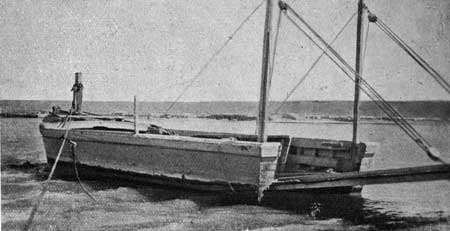
Ferry across Río Santa Cruz, Paso Ibáñez
Notes: (1) Those sections of the report dealing with consular business per se are set in smaller type (on a coloured ground), so that the reader who wishes to follow the trip narrative may comfortably skip them. (2) Names of persons, places and sheep-ranches visited have been emphasized, since they may be of interest to the local researcher; in most instances, transcription follows the original spelling. (3) The official despatch was accompanied by 47 photos, 29 of which related to places mentioned in the present extract. Unfortunately, these photos were not found in the same Foreign Office archive as the report. In their place we have inserted a number of photographs of locations mentioned in the text, taken around the same period.
November 4th. to 10th., 1922 (1,700 sea miles: Buenos Aires, Montevideo, Port Stanley, Punta Arenas)
Leaving Buenos Aires at 10 p.m. on November the 4th., I arrived at Montevideo early on the morning of the 5th. and embarked on board the P.S.N.C. "Ortega" during the afternoon of that day. On November the 9th. the "Ortega" arrived at Port Stanley, Falkland Islands, where I called on the Governor who was interested in securing reliable information as to whether foot and mouth disease had been reported recently in the district of San Julian, Patagonia. I promised Mr. Middleton to telegraph him the actual state of affairs on my arrival at San Julian. In the evening we left Port Stanley for Punta Arenas arriving at the latter port in the afternoon of November the 11th.
November 11th. to 14th., 1922 (Punta Arenas)
As soon as the steamer had received pratique, the British Vice Consul, Mr. Wildman, and Mr. Allan McDonald, C. B. E., came off to meet me in a Government launch. Mr. McDonald had previously arranged with me in Buenos Aires to accompany me on my tour through Patagonia as far north as Port Madryn and, as he had come down the coast by automobile from Santa Cruz to meet me at Punta Arenas, Mr. McDonald had made all arrangements for British subjects residing in the districts I proposed visiting to meet me on certain fixed dates.
A copy of the itinerary of my tour is attached hereto [not transcribed, Ed.] and, due to Mr. McDonald's care and foresight I was able to keep strictly to their dates fixed for my arrival. As many farmers live at considerable distances from the places I called at, and as it was also their busiest season, i.e. sheep shearing, no time was wasted by these British subjects who desired to meet me.
During the three days stay at Punta Arenas, whilst Mr. McDonald was having his car overhauled for our journey, my time was fully occupied.
On November the 11th Armistice Day, I attended the first banquet organized by The British Services Association of Punta Arenas; this reunion was well attended and will I hope become an annual institution; it not only brings together the men who volunteered and fought for the Empire, but these annual reunions serve as an object lesson to British subjects abroad.
I had the pleasure of visiting and of being entertained by The British Association of Magallanes. [signature in visitors' book] This Club is housed in most comfortable quarters, centrally located and occupied by the Association for the past fifteen years; it caters to the better class British residents and has a membership of two hundred and forty. Working men of the labouring class are well looked after by the 'Overseas Club' which I also visited. These two institutions must be of inestimable benefit to British subjects residing in this remote part of South America.
Another organization that I visited was the headquarters of the Punta Arenas Volunteer Fire Department to which many British subjects belong, and, on November the 14th I was invited to review five companies of these volunteer firemen, of all nationalities, in the Public Plaza. I noted that many of their fire engines and appliances were of British manufacture.
Before leaving Punta Arenas I called on the Governor in company with Mr. Vice-Consul Wildman and Mr. McDonald. The Governor received us very cordially and informed me that he would give instructions to the Chilean carabineers (Rural Police Force) to facilitate my journey through Chilian territory. The Chilian authorities received me with exceeding courtesy and rendered me every assistance in their power whilst I remained on Chilean soil.
Mr. Vice-Consul Wildman is a keen and energetic officer who commands the respect of the whole British Community in Punta Arenas; he was most kind and attentive to me.
Punta Arenas appeared to me to be a thriving and prosperous city with good banking facilities, large and well stocked stores and a cosmopolitan population. Prices appeared reasonable which is probably due to the fact that Punta Arenas is a free port.
Before commencing to report my tour by automobile, which started at Punta Arenas and ended at Port Madryn, I cannot speak too highly of the careful and well thought out arrangements which had been made in anticipation of our journey by Mr. Allan M. McDonald in whose car I travelled as far north as Puerto Deseado. By mutual arrangement I undertook to pay one half of the actual running expenses of Mr. McDonald's car during our tour so that the cost of my transportation was insignificant as compared with what it would have cost had I been obliged to hire automobiles for my journey. In view of the long distances to be covered without encountering any repair shops it was necessary to carry with us spare parts of all sorts in case of a breakdown and Mr. McDonald had also arranged for a mechanic to accompany us. It is needless to state that only a man with a thorough knowledge of Patagonia and local conditions could have thought out all the requirements for making such a trip; the completeness of Mr. McDonald's arrangements was demonstrated by the fact that I was able to keep all my engagements to time at every place I visited, covering a distance of one thousand six hundred and forty three (1,643) miles by automobile through a sparsely populated territory over unbuilt trails.
November 15th., 1922 (155 miles: Río Seco, Crucero Hotel, Ea. San Gregorio, Ea. Kimire-Aike, Ea. Cóndor)
Punta Arenas to Argentine Frontier On November the 15th, I started off from the Royal Hotel at Punta Arenas at 8.20 a.m. in company with Mr. McDonald; the mechanic and our luggage being stowed away in the interior of the car. The road was rough and bad until we got to Rio Seco but subsequently improved with only occasional bad stretches. Our route skirted along the north side of the Magellan Straits. At noon we stopped for luncheon at the Compañía Frigorifico de la Patagonia where during the season some four to five thousand sheep are slaughtered daily. After making a brief inspection of this freezing plant we proceeded on our journey, stopping for a few minutes at Estancia "Gregorio" of which Mr. Duncan McDonald is manager; later we stopped at Estancia "Kimire-Aike" and had tea with the manager Mr. Bayes. At 7 p.m. we arrived at the Estancia "Cóndor" where we spent the night and were most hospitably entertained by the Manager and his wife, Mr. and Mrs. Rodgers. This sheep farm is located on the frontier, part of the farm being on Chilian and part on Argentine territory. I was informed by the manager that he was caused considerable inconvenience through the necessity of having to secure a permit to move sheep from a pasture on the Chilian portion of the farm to the sheep dip on the Argentine side. The matter however was one in which I could not see my way to intervene.
Patagonian Gendarmeria. Rural Police Force. It was on the "Condor" sheep farm that I first came in contact with the Argentine territorial gendarmeria, a rural police force established in Patagonia since the disturbances caused by 'strikers' in 1921. Although this police force was originally intended for the protection of farmers and others residing in Patagonia, the men comprising the force appear to have been selected with little or no care and are a menace to sheep farmers rather than a protection. Sheep farmers on whose 'estancias' gendarmes are quartered are expected to house and feed them. The gendarmes do no police work, so far as I could ascertain, but were a continual menace to the farms on which they were stationed owing to their gross behaviour and undisciplined habits.
Whilst on this subject I would mention that the only complaints I received from British subjects on my tour were of abuses committed by the men of this force. During my interviews with the Governors of Santa Cruz and Chubut I took the opportunity of bringing this matter to their notice and I have subsequently heard that the gendarmeria have been disbanded by order of President Alvear and both territories are to be protected in future by regular military forces. This new arrangement will I am sure give great satisfaction to all British sheep farmers in Patagonia.
November 16th., 1922 (45 miles: Ea. Chymen-Aike, Río Gallegos)
I left the estancia "Condor" at 10.30 a.m. on November the 16th. after having first been shown over the sheep shearing sheds and other buildings on the farm, they were well constructed of corrugated iron and of ample capacity. The next estancia we stopped at was "Chymen-Aike" (Markham Dean) where we had luncheon with the manager Mr. C. E. Hobbs.
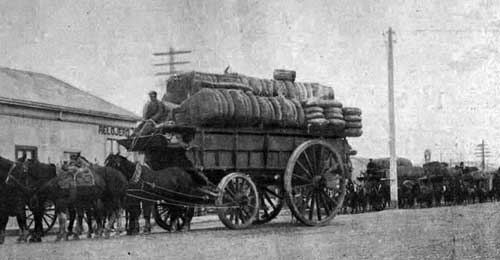
Transporting wool bales, Río Gallegos
Rio Gallegos Our next stop was at Rio Gallegos, capital of the territory of Santa Cruz, where I was the guest of our Consular Agent, Mr. Duncan M. Aitchison, who is also manager of the Anglo South American Bank. Rio Gallegos is a city of about two thousand inhabitants (2,000). It is ugly and uninteresting with unpaved streets except for the dust and sand which is being blown about all the time by the high winds so prevalent in Patagonia. About the only point of interest is the fact that Rio Gallegos is the seat of Government of the Territory of Santa Cruz. The shops are small and do not appear to carry any large or varied stocks. The principal exports are wool, frozen mutton and fox skins.
Shortly after my arrival I called on the acting Governor, Major Cefaly, in company with Mr. Aitchison and Mr. McDonald. Major Cefaly received me very cordially and mentioned that it was the first time that the Consul General of any nation had undertaken such a tour as the one I was making. He also expressed his satisfaction that a representative of Great Britain should have been the first to make such a journey by automobile in view of the large number of British sheep farms in the territory. After my interview with the Governor my party proceeded to the British Club where a reception had been organized so as to give British residents in this district an opportunity for meeting me.
Copy of an extract from the local newspaper “La Union” of Rio Gallegos dated November the 18th. is enclosed. [transcribed below, Ed.]
Claims. After the official reception I took the opportunity of discussing the matter of claims arising from the disturbances caused by "strikers" in 1921. I reminded claimants that the Argentine Government had taken immediate steps to suppress the disturbances and furnish proper protection to British subjects as soon as warned by His Majesty's Legation of the danger to life to which British subjects were being exposed owing to the action of the 'strikers'. Further, I pointed out that the Argentine Government had captured the principal 'strikers' and dealt with them in a summary manner, and that not a single British subject had been killed during the trouble, also that the territory of Santa Cruz was now perfectly quiet and safe to travel in, as I had found by personal experience and that, under the circumstances enumerated, claims by British subjects could not be presented through diplomatic channels. I further informed claimants that if they considered it expedient to press their claims they would have to present them direct to the Argentine Government in which case it would be advisable for them to cooperate with claimants of Argentine and other nationalities. The general opinion of claimants was that it would not be advisable for them to present their claims against the Argentine Government. (In some cases property claimed to have been destroyed by 'strikers' was insured against 'riots and strikes' and the owners have since recovered the value from insurance companies).
On the evening of November the 16th. a reception was given by the Consular Agent, Mr. Aitchison and his wife, at which I had the opportunity of meeting several more British subjects who were unable to attend the reception at the British Club.
November 17th., 1922 (Río Gallegos)
I inspected the Consular office, fee stamps etc. and found everything in good order. During the day I received a letter from Mr. Riddle [Riddell, Ed.], Manager of the "Anita" estancia, Lago Argentino, complaining of ill treatment he had been subjected to by Lieutenant Paune, who was in command of the territorial gendarmes (Rural Police Force) at Lago Argentino and I requested Mr. Aitchison to call on the Chief of Police to report the matter. I also received visits from Mr. C. G. Cameron of estancia "Guer-Aike"; John E. Rudd, one of the oldest settlers and others. In the evening a banquet was given in my honour by Major Cefaly, the acting Governor. Amongst the guests were Judge Viñas (Juez Letrado), Inspector of Police Wells (of British parentage); Dr. Etcheverry (Territorial Treasurer); the Governor's Secretary; Mr. Consular Agent Aitchison; Allan McDonald, C. B. E.; Herbert Elbourne (Secretary of Overseas Club); R. Gordon Rae (Managing Director of the Sociedad Mercantil de la Patagonia); John Patterson (Sub Manager Sociedad Importadora y Exportadora de la Patagonia).
Copy of an extract from the local paper “El Radical” of Rio Gallegos dated November the 19th. is enclosed herewith. [not transcribed, Ed.]
During the evening I took the opportunity of bringing to the Governor's notice the complaint of Mr. Riddle against Lieutenant Paune. Major Cefaly was evidently acquainted with the case as he informed me that Riddle was a Chilian and not British. The governor also informed me that the Lieutenant had been recalled and another officer sent to replace him; he further stated that if Mr. Aitchison would call and see him on the following day the Governor would show him all the papers connected with the case. This I requested Mr. Aitchison to do.
From my interviews with the Governor, the Inspector of Police and other officials I gathered that they were friendly to and respected the British in Patagonia, in fact the Governor mentioned to me that if it had not been for British sheep farmers, who were the first to discover the possibilities of sheep farming in Patagonia, the country would never have been made productive.
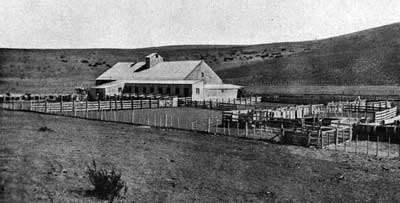
Typical shearing shed and pens
General Description of Southern Patagonia The general aspect of this region is bleak and bare. Endless miles of flat 'pampa' stretching to the horizon only broken by occasional valleys and deep canyons which test the endurance of an automobile both in the descent and the ascent. There are no built roads and the tracks over which we had to drive must have been originated by mule carts whose drivers had allowed their animals to pick their own way. The country is devoid of trees due to the high winds and the only vegetation consists of small scrub bushes some 18 inches high: to avoid these the trail apparently has been made to twist and turn in every direction.
Practically the whole of Southern Patagonia is fenced for sheep and the roads or trails pass through fenced pastures of enormous area. In order to avoid the necessity of opening gates and the risk of travellers in motor cars omitting to shut them again, the greater number of sheep farms construct sheep guards alongside their gates. These sheep guards consist of 2 inch planks set on edge and spaced about 6 inches apart. Whilst a motor car can pass without difficulty sheep will not attempt to cross and much time and inconvenience is saved to travellers in automobiles.
To a casual observer the 'pampa' appears almost devoid of pasture but I am informed some 800 to 1500 sheep can be raised on a square league of land (9 square miles). The grass although scant being very nourishing.
Water is scarce and many farmers have to dig wells and erect windmills in order to provide water for their sheep on the dry 'pampa'.
In southern Patagonia the high winds, scarcity of natural pasture and limited water supply renders the raising of cattle out of the question. Sheep farming is the only paying industry in this bare and arid country.
The climate in general is cold and bleak and high winds are prevalent practically all the year round; it is however healthy. British sheep farmers endeavour to make themselves as comfortable as possible inside their homes. Their houses are large and comfortable and indoors they live in comfort and are able to forget the barren dreariness of the outside world. The hospitality of the Patagonian sheep farmer is proverbial and, as a general rule, they are only too pleased to meet and entertain occasional travellers.
November 18th., 1922 (114 miles: Ea. Guer-Aike, Puerto Coyle, Ea. Smith, Ea. Cañadón de las Vacas)
Leaving Rio Gallegos on November 18th. our next stop was at the estancia "Guer-Aike" where we had luncheon with Mr. Cameron and it was shortly after leaving this farm that we met with our first mishap as the driving belt of the radiator fan broke. This however caused little inconvenience as we were running against a strong head wind that kept the fan revolving and the engine fairly cool. In the afternoon we arrived at Puerto Coyle where we had tea at Mr. Smith's estancia subsequently continuing on until we arrived at estancia "Cañadon de las Vacas", the farm of the Reynaud [Reynard, Ed.] family where we were most hospitably entertained by Mr. Reynaud and his sister. This was one of the farms encountered during our journey that had a few trees round the house; the high winds in this region rendering any attempt at arboriculture a difficult and thankless proceeding.
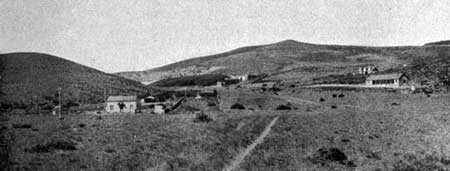
Estancia Cañadón de las Vacas
November 19th., 1922 (Ea. Cañadón de las Vacas)
Sunday, November 19th. was spent driving around "Cañadon de las Vacas" inspecting the wool sheds etc.
November 20th., 1922 (75 miles: Ea. Dor-Aike, Santa Cruz)
[...] on the following day we again renewed our journey north starting off with a long uphill drive until we arrived on the flat tableland. No trees or hills could be seen as far as the eye could reach. The weather was cold and damp. During this day November 20th. we stopped at Estancia "Dor-Aike" belonging to the Dobrée Brothers with whom I discussed the matter of "claims" and, they concluded that it would be better to drop any idea of pressing their claim against the Argentine Government. From Dobrée's farm we had a long steep descent to the port of Santa Cruz the trail being wet and greasy. In the afternoon we had some slight trouble with one of the spark plugs on the car which was soon rectified. A few miles outside of Santa Cruz we were met by Mr. Lionel A. Harris and Mr. Peter MacLean, manager of the Anglo South American Bank at Santa Cruz. Accommodation had been secured for my party at the Phoenix Hotel, run by an Englishman Mr. George Felton.
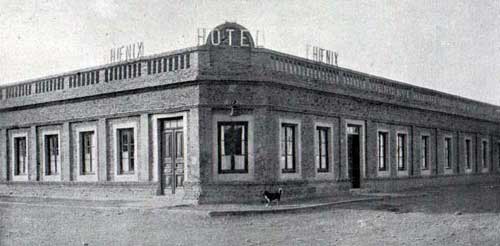
Phoenix Hotel, Puerto Santa Cruz
Soon after our arrival the Chief of Police called and informed me that he had received instructions from the Governor at Rio Gallegos to place himself at my orders and to render me all the assistance in his power. He also offered to place a policeman to wait on me during my stay, which I refused with thanks.
Santa Cruz Santa Cruz is very similar to Rio Gallegos. It is a flat uninteresting town very windy and dusty. The average annual rainfall is only 6½ inches.
Compressed bales of wool are freighted down in mule carts and motor trollies to Santa Cruz from the various sheep farms in this district. The bales are unloaded on the beach pending the arrival of a coasting steamer. The system in practice for loading wool on board steamers, which have to lie some distance off the coast, is to run lighters up on to the beach at high tide and when the water falls the wool is loaded on to these barges which are floated off again by the next tide, and towed out to the steamer.
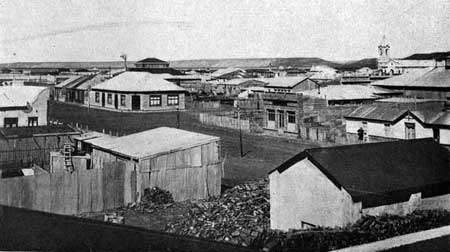
Town of Puerto Santa Cruz
November 21st., 1922 (18 miles: Anglo Persian Oil well, Ea. Los Pescadores)
It is near Santa Cruz that the Anglo Persian Oil Company recently started drilling for oil and during my stay in this neighbourhood I motored out in company with Mr. McDonald and the Chief of Police to see the well which at that time was only 250 metres down and no oil had then been encountered.
Whilst at Santa Cruz I was approached by several British subjects who asked that an unsalaried Vice Consul should be appointed and they recommended Mr. Lionel A. Harris for the post. In support of their recommendation a list of British estancias was handed to me and I find there are fourteen estancias entirely British-owned in this district representing £597,000 besides another four farms partly British-owned, there are also 240 British subjects in the vicinity.
November 22nd., 1922 (90 miles: Paso Ibáñez, Paso del Río Chico, Ea. Primavera, Ea. Porteña, Ea. Lai-Aike)
On November the 22nd. we left Santa Cruz, for Paso Ibañez where we had to make arrangements for crossing the Santa Cruz river with the motor car. The river at this point is about half a mile wide and we had to wait two and a half hours before we could get the motor car loaded on the ferry. After crossing the Santa Cruz river we stopped at Robert White's Hotel for a few minutes whilst the owner related to me the experiences of himself and his family during the labour disturbances in 1921. White had no complaint against the "Strikers" who, whilst they occupied the north bank of the river, appear to have treated British subjects with consideration. The Hotel however was between the two contending fires and incidentally received the fire of Government troops who were firing on the "strikers" from the other side of the river. Neither White nor any of his family however were injured. After taking on a fresh supply of petrol we started off again for the Rio Chico (little river) where we were again delayed waiting for the ferry to take our car across. Whilst passing an Argentine estancia called "La Primavera" the owner stopped us to see if we would allow our mechanic to examine the motor of his sheep shearing plant which had broken down, [so that] he was unable to continue shearing. After our mechanic had examined the motor he found nothing could be done as certain parts had been broken. Our mechanic was able however to explain to the owner of the estancia exactly what parts would have to be replaced and a messenger was sent off to Santa Cruz for the necessary repairs.
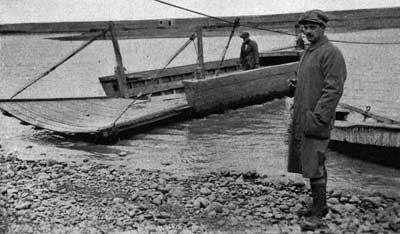
Ferry across Río Chico
During the day we saw numerous wild ostriches (rhea) and guanacos (llamas) many of them so close to the car as to be well within revolver range. We stopped for a few minutes at Estancia "Porteña" (Mr. Allan McDonald's farm) and then proceeded to estancia "Lai-Aike" where we expected to spend the night. Owing to delays crossing the Santa Cruz and Rio Chico Rivers we were still on the trail at 8 p.m., when we met Mr. Patterson, one of the owners of "Lai-Aike" farm and his manager Mr. Fraser who had driven out to meet us, fearing that our car might have broken down. Although both foot and hand brakes of our car had broken during the day we managed to get along by using the reverse gear pedal as a brake when descending canyons.
November 23rd., 1922 (50 miles: Ea. Lai-Aike, Ea. Coronel, San Julián)
On the following day (November 23rd.) I was shown over the estancia by Mr. Patterson. Sheep shearing and dipping being in full swing. After luncheon we continued our journey to San Julian accompanied by another car containing Mr. William Patterson and Mr. Robert Patterson, part owners of the "Lai-Aike" Sheep Farming Company.
The trail was very rough having been badly cut up by the heavy carts transporting wool from farms in this district to San Julian for shipment. We stopped at the San Julian Sheep Farming Company which covers an area of about 700 square miles and had tea with Mr. Blake and his family.
Arriving at the top of the canyon leading down to the port of San Julian a tyre cover burst which was soon replaced.
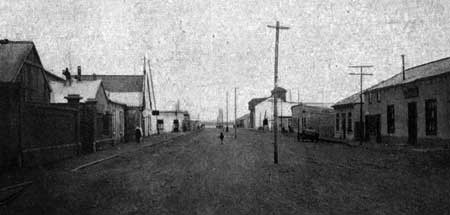
Main street, San Julián
San Julian Accommodation had been reserved for my party at the Miramar Hotel. British and Argentine flags were flying over most of the business houses as well as the Hotel in which I was stopping. Immediately after our arrival I received a visit from the Mayor of the city and principal local authorities who called to welcome me and place themselves at my orders. I was informed by the Mayor that the local authorities, in conjunction with the British Community of San Julian, had arranged a banquet in my honour for that evening and they hoped I would not be too tired to attend.
When thanking the President of the Comision de Fomento and accepting their kind invitation I mentioned the pleasure it gave me to find such cordial relations existing between my fellow countrymen and Government officials.
During the banquet which was attended by all the local Government officials and a large number of British subjects, the dominant note in all the speeches showed the excellent relations existing between the Government officials and British. Mr Fraser, one of the oldest British residents in this district, requested in the name of the British Community that a Vice-Consul should be appointed and that Mr. Robert Patterson who had resided for over 22 years at San Julian and who commanded the good will and respect of the entire Community should be appointed Vice Consul.
I stated that I should be pleased to recommend to HIs Majesty's Government the creation of an unsalaried Vice-Consulate at San Julian and would submit the name of Mr. Robert Patterson for the post. This announcement was received with applause by both Government officials and British subjects.
November 24th., 1922 (San Julián)
The following day November 24th. I spent calling on local officials and discussing the subject of claims with British farmers who agreed that it would be best for them not to take any further action. All the farmers I saw stated that they were doing well this year; they were getting a good wool clip and the price was also good, in fact business conditions appeared very favourable in this district.
November 25th., 1922 (42 miles: Oil well Lyman Chatfield & De Ganahl, Ea. Mata Grande)
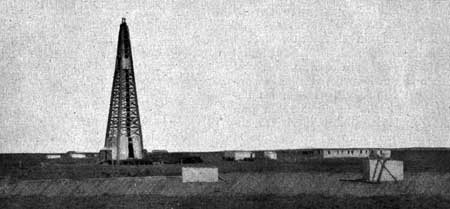
Oil exploration, San Julián
I left San Julian on November 25th. for estancia "Mata Grande" owned by Patterson Bros. Between San Julian and "Mata Grande" I visited an oil well that had just been started by the South Rivadavia Oil Company. The men in charge of this well were very reluctant to furnish information but I understand The Standard Oil Company are at the back of them. We arrived at "Mata Grande" at 7 p.m.
November 26th., 1922 (165 miles: Ea. Los Manantiales, Bahía Laura, Ea. G Anderson, Puerto Deseado)
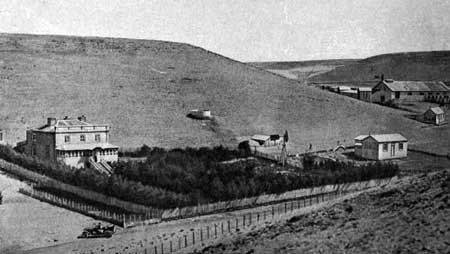
Estancia Mata Grande
On November 26th. I was taken over the wool sheds very early as we had to leave the estancia at 7 a.m. in view of the long day's drive ahead of us.
From "Mata Grande" we had a long hard pull up a canyon, the trail being badly cut up and very sandy; the country generally was rough and broken. During the morning the hub of one of the rear wheels broke which delayed us about three quarters of an hour whilst the mechanic effected the necessary repair. During this day we made short stops at McGillivray's Farm and estancia "Tcheon-Aike" belonging to Mr. McLeod where we found, owing to the bad road we had come over, our supply of petrol was running short. We managed however to borrow sufficient from McLeod to carry us through to Bahia Laura, a small village on the coast, where we were able to purchase enough petrol to carry us through to Puerto Deseado. On our arrival at the Deseado River we found that arrangements had been made by the local authorities to have my party conveyed across the river in a motor launch to the town which is located on the north bank of the river.
The Port of Deseado is a picturesque town of some twelve to fifteen hundred inhabitants. We were met after crossing the river by Mr. Robert Oerton, a British merchant and Mr. Williams, the manager of the Anglo South American Bank. The town was decorated with Argentine and British flags in honour of my arrival. Accommodation had been reserved at the Hotel Argentino.
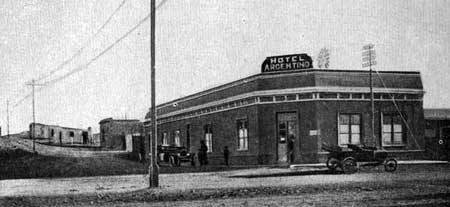
Hotel Argentino, Puerto Deseado
November 27th., 1922 (Puerto Deseado)
On the 27th. November a dinner followed by a dance had been organized by the British Community so as to give me an opportunity for meeting them. During the after dinner speeches I was requested to consider the establishment of an unsalaried Vice Consulate at the Port. I informed the Colony that I proposed recommending the appointment of a Vice Consulate at San Julian which if approved by His Majesty's Government would in conjunction with the Vice-Consulate already established at Comodoro Rivadavia, place the Port of Deseado within reasonable distance of a Consular Officer, and that later on I might see my way to recommending the establishment of an unsalaried Vice Consulate at Port Deseado.
Shortly after our arrival the Comisario of Police called to pay his respects.
From Puerto Deseado there is a Government Railway running to Colonia Las Heras. This railway is well constructed, broad gauge, and has good rolling stock.
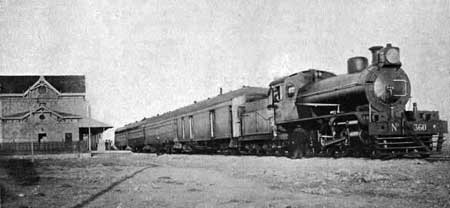
Railway train, Puerto Deseado
The Argentine Government is seriously considering establishing a naval base at this port.
At Puerto Deseado I had to separate with regret from my travelling companion, Mr. Allan McDonald who was detained on important business connected with his firm; his resourcefulness and knowledge of the country and its inhabitants would be difficult to equal. Mr. McDonald very kindly arranged for Mr. Grant, also connected with Cooper Nephews Limited, to accompany me as far as Comodoro Rivadavia.
November 28th., 1922 (165 miles: Puerto Deseado, Jaramillo, Las Heras, Ea. Cameron)
I left Puerto Deseado on the morning of the 28th. November, our road running almost parallel to the railway. It was a wretched day; cold, wet and windy; the country flat and uninteresting except for the number of wild ostriches and guanaco that we encountered on the trail.
Colonia Las Heras was reached about 5.30 p.m. and there I found Mr. William Cameron waiting to meet me and take me out to his estancia to spend the night. Cameron's farm is about one hour's drive by motor car from Colonia de las Heras and I was most hospitably received and entertained at this estancia. It was a relief to get inside a comfortable English home after the unpleasant weather I had experienced since leaving Puerto Deseado.
November 29th., 1922 (181 miles: Ea. Cameron, Boliche Herbacio, Comodoro Rivadavia)
It was my intention to have continued to Comodoro Rivadavia early the next day (November 29th.), but the weather was so bad and my hosts so insistent for me to spend the day with them that I finally compromised and postponed my departure until after luncheon. On leaving Cameron's farm we had a long steep climb to get out of the valley on to the high table land. The weather was very cold and windy but we did not appreciate the strength of the wind until we got out of the valley on to the flat "pampa". Here the wind was blowing with such force that we could hardly make any headway with our car. Dust and sand were flying through the air and we could see the storm blowing with increased vigour ahead of us. The trail soon became obliterated by driving sand so that it was difficult to find the road; our car was also constantly getting stuck in sand drifts, which required all our joint efforts to release. The wind continued to increase and our faces were cut with the flying sand so that it was a pleasant respite when we arrived at a wayside "boliche" (inn) and rested for 10 minutes. The proprietor informed me it was one of the worst storms he had known and advised us to wait over until the next day before attempting to get through to Comodoro Rivadavia. I decided however to push on, rather than risk having to sleep on a bed with unwelcome bed fellows. We managed to get along alright until we came to a steep canyon where we ran into a sand drift that took us two and a half hours to get the car through. We finally arrived at Comodoro Rivadavia at 8 p.m. almost blinded and our faces cut with the driving sand during this day's run.
[end of extract]
------ o - O - o ------
Annex: Extract from “La Union” of Rio Gallegos dated November 18th. of 1922
Visit of the British Consul General
As previously arranged, the British Consul General in the Argentine Republic, Mr. H. W. Wilson, arrived on Thursday afternoon and after paying an official visit to the acting Governor repaired to the British Club where a large gathering of members and friends accorded him a most hearty welcome. After the playing of the Argentine National Anthem on the piano by Mr. Francis Cooper, Mr. Loewenthal who was in the chair, proposed the toast "The land we live in, and his Excellency Dr. Alvear", which was heartily responded to. Mr. Aitchison, in charge of the local Consular Agency, then proposed the toast "His Majesty the King" which was equally responded to.
Mr. Herbert J. Elbourne, in a very able speech expressed in the name of the British Colony, the pleasure and satisfaction which the visit of the representative of the British government had caused, it being the first time that Santa Cruz had been thus privileged, and showed the deep interest which the Consular Service had in the many Britishers resident in Patagonia and the desire to have first hand information as to the conditions ruling here, in order to be in a position to give better protection to British subjects. After referring to the gratitude which the club members and the British community in general, owed to Mr. McGeorge for the donation made of the Club premises, Mr. Elbourne voiced the desire that the Consular Agency should be raised to a Vice Consulate, with Consular agencies in Santa Cruz, San Julian and Deseado, which he considered necessary, bearing in mind the extent of the district covered. He also expressed the wish for better facilities to be given to ex-service men in regard to the collection of their pensions, as many of them found it not only difficult but expensive, owing to the long distances, to come in to Gallegos to comply with the necessary legal formalities. After mentioning in detail other matters of interest to the community, the speaker closed proposing the toast "Our Guest and the Consular Service".
At this juncture the acting governor Major Cefaly was announced who with police Inspector Wells, came to return the visit paid him earlier in the day by Mr. Wilson. After conversing with this gentleman for some twenty minutes, Mr. Elbourne in a few well chosen words proposed the health of the local authorities. His Excellency suitably replied toasting to the British community, after which he took his leave escorted to the door by Mr. Wilson.
Mr. Wilson then spoke stating the great pleasure that it had given him to visit this part of his charge, which had also been a great surprise to him, the wealth and number of the Britishers here being quite a revelation to him. He said that on taking over the Consulate a little under two years ago, he could obtain no reliable information either in the Legation or the Consulate, with regard to Patagonia, the position of which was only known on the map, which made him decide to pay this visit in order to gain a personal insight into local conditions. Mr. Wilson who uses no flowery language, gave a clear and plain talk involving many matters of interest to the community, and stated that he had already given instructions for granting facilities to ex-service men.
He also wished to emphasize the necessity for all Britishers to be registered in the Consulate, and their possessing passports, the only legal document by which nationality could be proved under existing laws.
After the singing of "God save the King" a very pleasant and profitable reunion broke up.
In the evening an informal reception was held in the Consular Agency, which by the kind courtesy of Mr. and Mrs. Aitchison was thrown open to the community, dancing being kept up until the early hours of the morning. Amongst those present we noticed, Mesdames, Elbourne, Patterson, Hawkins, Slater, Lawes, Ritchie, Lockyer, MacGillivray, Cooper, Miss Hawkins and Messrs, Loewenthal, Elbourne, Patterson, Lewis, Cooke, Palmer, MacCormack, Watson, Slater, Williams, Wilson, MacGillivray, Lockyer, Ritchie, Hawkins, Gallie, Clutton, Gilbert, Davison, Gordon Rae, Cooper, Littlejohn, MacDonald, Leslie and Darling, etc. etc.
------ o - O - o ------
Claims from British residents in Santa Cruz received through British consular agent at Río Gallegos
N.B. Only claims prepared in accordance with the Consul General's instructions were included in this official list.